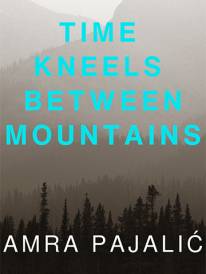Hayley Atwell Brideshead Revisited & The Duchess Interview
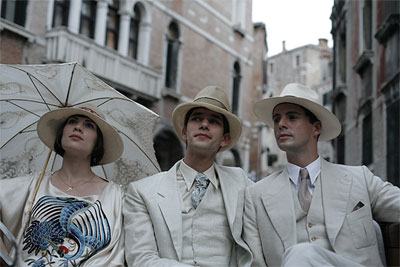
HAYLEY ATWELL TAKES ON ICONIC 'BRIDESHEAD
EXCLUSIVE Hayley Atwell; Brideshead Revisited & The Duchess Interview by Paul Fischer.Beautiful British actress Hayley Atwell is making quite the name for herself on both sides of the Atlantic, on stage and screen. Having most recently starred in Woody Allen's Cassandra's Dream, the actress stars as the often-cold Julia Flyte in Brideshead Revisited, and will be seen later this year opposite Keira Knightley in The Duchess. In this exclusive interview, Atwell also reveals that she is about to start production on the miniseries The Prisoner.
The actress talked to PAUL FISCHER.
Paul Fisher Have you watched the original TV version of Brideshead?
Hayley Atwell:, I haven't. But I've been working at the National Theatre and Jeremy Irons is in the dressing room below me. [LAUGHTER] That's the closest I'm getting to the original.
Paul Fisher I take it you haven't spoken to him about it.
Hayley Atwell: No. We've been talking more about theatre, and what he does with his dogs on tour, but I think it's something that I wouldn't want to bring up with him unless he asks me to, because it's the thing that made him such a household name. It's a huge deal. I don't know how he feels about it.
Paul Fisher Tell me how difficult it was for you, if at all, to get the part of Julia?
Hayley Atwell: Well, I read the script, and I auditioned twice, I believe and both times put on tape for Miramax. But the recall auditions, my second audition, the casting director had advised me to really go for it. We wanted to really see more of Julia's vulnerability and so in the recall, I spontaneously decided to smack Matthew Goode around the face in a violent outburst, which happens in the fountain scene. I think that was what the director was looking for, just something a little bit feistier than previous people who had interpreted Julia as someone who's quite insipid, or quite boring. And I think that that's probably what got me the part I was working in theatre at the time. And so when it comes to be putting up for such amazing roles in such big films, you just go in and you think, "Well, there's no way I'm going to get it, so I might as well just do my best." And I think that relieved some of the pressure off of me, because I just thought, this is something enormous.
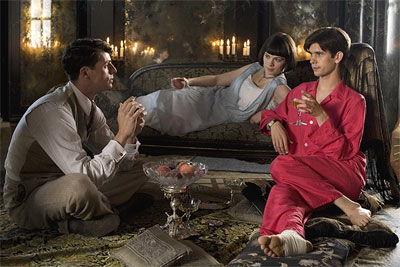 Paul Fisher What are the challenges for you in playing a woman who is so reserved on the one hand, but bursting with the kind of emotional sense of vulnerability on the other hand? I mean, what do you draw on, playing a character like this? With such conflict?
Paul Fisher What are the challenges for you in playing a woman who is so reserved on the one hand, but bursting with the kind of emotional sense of vulnerability on the other hand? I mean, what do you draw on, playing a character like this? With such conflict?Hayley Atwell: Well, I think the Catholic guilt is the one thing that is restricting her and I went to church, and Catholic school growing up, so I had a little bit of a sense of the Catholic guilt that's ingrained, especially within Julia at that time. But personally, I think the easiest thing for me was, I was walking into Castle Howard, which was being Brideshead, and also the clothes and the - even the hair. Everything was very grand, but also quite oppressive, quite daunting, very haunting. And so it was - it was just up to me to breathe into that world, and to inhabit that world. And a lot of the work had been done for us, because of how extraordinary the house is, and what the costume and makeup was.
Paul Fisher Indeed. So geography and physical appearance, in the case of this piece, really does inform, in some ways, the way you interpret the character.
Hayley Atwell: Hugely. Absolutely. And I come from drama school, which is very physically-based. The thing with film is realizing it is a visual medium and that there are so many very powerful images throughout the film, which I felt, were giving me the character. I just understood - it was understanding who Julia was more and more, by just walking through the grounds of Castle Howard, and trying to imagine what it would have been like to actually have been a child, and growing up in that environment.
Paul Fisher The miniseries obviously did not inform anything that you did on this, but how closely did you study the book?
Hayley Atwell: That became my Bible. I read it a couple of times once I'd gotten the park. And then there was - you know, highlighting sections, and annotating, and seeing what they had done in the script, and where they had changed it round. And of course, in the book, Julia doesn't go to Venice. And that was one - I think the main differences between our film and the book. And so just having to understand why they had made that choice. And the book talks - although it's hard, because the book is obviously, again, through Charles Ryder's eyes. So you see a little bit more of Julia. But she remains an enigma throughout the book. And I felt that the script, by putting her into Venice, you can see a slightly freer side to Julia. Which is something where her passions arise, and she's away from Brideshead. And that, I felt, was the link between Julia's inner world, and what the book was covering up.
Paul Fisher How intimidating was it for you to work with Emma Thompson? And she played such an intimidating character.
Hayley Atwell:Well, she's the most unintimidating woman you could meet in real life, which was amazing. From day one, she dispelled any fears in us, of what we were doing, or of how we could be with her. She invited everyone round to Sunday lunch at her house, and she organized trips to the Brompton Oratory Church so we could experience a Latin Mass. And she very much took on the matriarchal role. And also, the kind of naughty auntie role. We had a lot of fun partying with her. And those things meant by the time that we got on set, it was - everything was broken anyway, so we were able to have a lot of fun with her. And she's so different from the character, to the point where she - on a cut, she would laugh nervously at her own disbelief at how cruel she had been in that take, and how cruel Lady Marchmain was, and trying to bring that character to life. And it's testimony to her talent that she was able to step into it, and give such an extraordinary, cold performance.
Paul Fisher It's a very British piece, and it is very much a comment on the British power system, which was very prevalent at that particular time.
Hayley Atwell: Yeah.
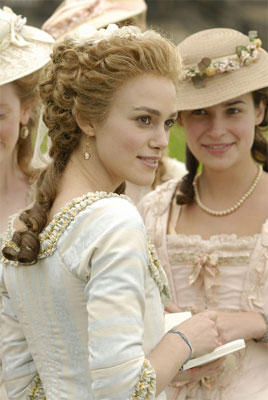 Paul Fisher How do you think American audiences will react to some of the film's very wry, and very specific British tone?
Paul Fisher How do you think American audiences will react to some of the film's very wry, and very specific British tone?Hayley Atwell: Well, as far as I'm aware, the Americans love that. They find it very interesting, in our British history. That felt - I mean, I'm half-American, so I've also spent quite a bit of time here. And that's always seemed to me something that the Americans love. They love a good Brit period piece. And so I felt that the response independently of the series was that they were very excited about Brideshead, because it's very decadent. And also, it's a world that doesn't exist as much - you know, doesn't really exist anymore at all. And the Americans have always been very welcoming to that kind of world. Because it's also - it's also a very romantic idea, the class system, for them. Because, of course, Americans don't have it the way that we still do.
Paul Fisher Why did you want to be an actress, Hayley? What was it in you that drew you to this profession?
Hayley Atwell: Ooh, that's a good question. I don't remember a time when I wasn't thinking about it, or I don't remember a time when I thought I wouldn't be doing it. And so when I was younger, all my focus and my thoughts and energy went into watching great stories being told, either live or on film. And I think it is in - you know, Julia has Catholicism. I have storytelling. That's my church. That's what I feel is the greatest place to inhabit, and a great privilege to be a part of.
Paul Fisher Unlike American actors, who feel it's more important to work in film before they do anything else, to you it's obviously more important to work in the theatre. Is it important for you to continue doing that, despite your sudden escalation into the film world?
Hayley Atwell: Yes. Well, I'm just - earlier this month, I just finished a six-month stint at the National Theatre doing a George Bernard Shaw play.
Paul Fisher Which one?
Hayley Atwell: It was Major Barbara, and I was doing Major Barbara, with Simon Russell Beale. And so I had done two films back to back, Brideshead and then The Dutchess, and then I went into six months of theatre. And it's not so much a - it's not a choice one makes because they're hoping it's going to do good things for their career. It's just what - the work that's offered to me, and the best work that I think is around and something that is very challenging. And theatre is always, to me, incredibly difficult and challenging. And it's like going back to the foundation.
Paul Fisher The Dutchess is a pretty big film. Can you talk a little bit about the experience working on that, and the character of Bess, that you play in that?
Hayley Atwell: Yes. Well, it was very insightful. Because - you know, obviously Keira's been doing this for about ten years now, I think. And she has such knowledge about the industry. And she's had to grow up and learn in front of everyone, which has been incredibly tough. But she's triumphing now, and she's come out the other side. And she's an acclaimed actress. And I think that was - it was fascinating to be around her, and to watch her work ethic, and how professional she is. We spent a bit of time living together at a country house, and had hot country dinners together. And we were able to just get on as two young girls in their early 20s, and just hang out. And that was great, because that helped relieve some of the tension that was going on within the story, of what we were doing. Because I play Bess, who is her best friend and her confidante, but also ends up becoming the mistress of her husband, the Duke.
Paul Fisher How lovely for you.
Hayley Atwell: Really nice. So I get fantastic scenes with Ralph and Keira, which is an amazing - very different from my drama school days. But then also the other aspect of it, is that she's mediated between them. She understands Georgiana and the Duke in a way that they don't understand each other. And Bess Foster, who was a real person, was, I think, the main reason why they were able to have a successful marriage. And she was accepted by them both, and they lived as a ménage a trois. And when Georgiana died, she asked that Bess become the next Duchess of Devonshire. So they had this amazing understanding that takes a lot of sacrificial love in order to deal with, and to get over feelings of jealousy and envy. And the film explores that a little bit, and then also - it's a very, very beautiful film, and is a true story, as I said, and explores what you would do for your children, and having to give up things for your children. Which Georgiana experiences, but also Bess. The Duke's the only person that could actually give Bess custody over her kids, because he has power. And that's also one of the reasons why she becomes his lover.
Paul Fisher It's been announced that the movie is going to premiere at the Toronto Film Festival.
Hayley Atwell: That's correct.
Paul Fisher Are you planning on attending?
Hayley Atwell: I know I'm going to be in Namibia.
Paul Fisher Oh my God, it's a tough life. [LAUGHTER] Doing -
Hayley Atwell: It's The Prisoner television series with Ian McKellen and Jim Caviezel.
Paul Fisher Okay. Now, is this based on the original?
Hayley Atwell: Yes. It's a weird sci-fi - half of it will be based in New York, though, and the other half in this village.
Paul Fisher Is it a series, or a mini-series?br>
Hayley Atwell: It's a six-parter, so I don't know what they'll be doing afterwards. Because I didn't know how the original works. But - yeah. It's six parts, with ITV, but I think also America. It's being sold to a channel.
Paul Fisher And whom do you play in it?
Hayley Atwell: I play a girl called Lucy, who is the prisoner's kind of love interest, but you realize very quickly that nothing is what it seems, and she's actually working for a corporation that is responsible for this so-called village, where people are leaving their names and identity, and being called by their numbers. And then you also see Lucy in the village, and she's someone with a number this time, and she's also blind. And it's a bit of a mystery as to who she is. It's ambiguous. But it makes for exciting television.
Paul Fisher Do you know what you're going to do after that, yet?
Hayley Atwell: I don't. There have been a few projects and scripts that have come by and come my way, but I kind of want to give it some time, and see what the next step would be, just to take things very slowly.
Paul Fisher Do you want to move here, or do you want to try and work here?
Hayley Atwell: I would work wherever the project is that I feel very drawn to. I love the States, because obviously my father's American. So I spend a lot of time here anyway. So it wouldn't be a big move for me to come over here. But I wouldn't want to just base myself in LAand see what happens. I'd rather come here for a specific project.
Paul Fisher So you have dual citizenship, I take it?
Hayley Atwell: Yes, I do.
Paul Fisher Well, that could come in very handy.
Hayley Atwell:Yes! [LAUGHTER]
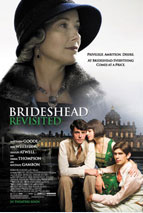
Brideshead Revisited
Starring: Matthew Goode, Ben Whishaw, Hayley Atwell, Emma Thompson, Michael Gambon, Greta Scacchi, Jonathan Cake, Patrick MalahideDirector: Julian Jarrold
Genre: Drama
Synopsis: Though director Julian Jarrold's adaptation of the Evelyn Waugh novel BRIDESHEAD REVISITED spans decades and continents, it's a taut film that never drags and can excite contemporary audiences. Matthew Goode (MATCH POINT) stars as... Though director Julian Jarrold's adaptation of the Evelyn Waugh novel BRIDESHEAD REVISITED spans decades and continents, it's a taut film that never drags and can excite contemporary audiences. Matthew Goode (MATCH POINT) stars as lower-class Londoner Charles Ryder, an aspiring artist who is beginning his studies in history at Oxford in the 1920s. A chance encounter with dandyish aristocrat Sebastian Flyte (Ben Whishaw, PERFUME) changes the course of his life. The two embark on a close, intense friendship that is further complicated by the introduction of Sebastian's beautiful sister Julia (Hayley Atwell, CASSANDRA'S DREAM) and his overbearing, extremely religious mother, Lady Marchmain (Emma Thompson).
BRIDESHEAD REVISITED follows Charles from the carefree '20s through the beginning of World War II, focusing on his complicated relationship with the upper-class family and their estate, Brideshead. Along with ATONEMENT's Joe Wright, Jarrold (BECOMING JANE) represents a new era of British period filmmaking. Both men bring a modern sensibility to their work that makes their films feel fresh and sexy, though they never lose authenticity. Jarrold employs some handheld camera work and quick-cut editing in BRIDESHEAD REVISITED, two techniques that separate his film from others in the genre. Fans of the book--and the 11-hour 1981 miniseries--may bristle at the film's relatively brief running time, but screenwriters Andrew Davies (the BBC classic PRIDE AND PREJUDICE) and Jeremy Brock (THE LAST KING OF SCOTLAND) have distilled the story into the essentials. BRIDESHEAD REVISITED deftly works with the conflicts of class, religion, and desire and, with its artful costumes and gorgeous settings, is essential viewing for fans of the genre.
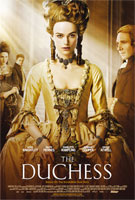
The Duchess
CAST: Keira Knightley, Ralph Fiennes, Charlotte RamplingDIRECTOR: SAUL DIBB
GENRE: Romantic period drama
THE DUCHESS is a chronicle of the life of 18th century aristocrat Georgiana Spencer, the Duchess of Devonshire, who, long before the concept existed, was the original 'It Girl'. Liker her direct ancestor Princess Diana, she was ravishing, glamorous and adored by an entire country. But even as her popularity grew, she was haunted by the fact that the only man in England she seemingly could not seduce was her very own husband, the Duke. And when she tried to find her own way to be true to her heart and loyal to her duty, the resulting controversies and convoluted liaisons pushed her to the bring of banishment by her husband, family and all of London society.
Starring Academy Award nominee Keira Knightley and Academy Award winner Ralph Fiennes, THE DUCHESS is the sumptuous story of an extraordinary woman who rose to fame by staying true to her passions in a world of protocol, gossip and social rules - and paid the price.
MORE
- Mission: Impossible Fallout
- Glenn Close The Wife
- Allison Chhorn Stanley's Mouth Interview
- Benicio Del Toro Sicario: Day of the Soldado
- Dame Judi Dench Tea With The Dames
- Sandra Bullock Ocean's 8
- Chris Pratt Jurassic World: Fallen Kingdom
- Claudia Sangiorgi Dalimore and Michelle Grace...
- Rachel McAdams Disobedience Interview
- Sebastián Lelio and Alessandro Nivola...
- Perri Cummings Trench Interview



